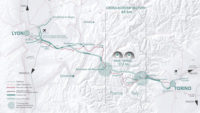French Team Begins Work on $1.5B Ivory Coast Metro Project
The Abidjan Metro's first line will have a capacity of 500,000 passengers a day

Photo Courtesy Keolis Group
A consortium of four French companies started construction of a 37.5-km metro rail line in Ivory Coast's capital of Abidjan, shortly after the initial engineering, procurement and construction contract was amended and the government approved the partnership’s subsequent technical and financial submissions.
Société des Transports Abidjanais sur Rail (STAR) consortium, made up of project lead Bouygues Travaux Publics, Colas Rail, Alstom and Keolis, signed the amended contract with the Ivory Coast government in last December, paving the way for excavation work.
The amendment was triggered by changes to project ownership structure that started in 2014 with the award of a build-operate-transfer concession agreement between the government and French-South Korean consortium of DTP Terrassement, Bouygues, Hyundai Rotem and Dongsan Engineering. Bouygues, Dongstan Engineering, Hyundai and Keolis had 33%, 9%, 33% and 25% stakes in the project respectively.
Hyundai was to supply rolling stock and signaling while Dongsan was to be responsible for electrification. Bouygues and DTP Terrassement were in charge of engineering.
However, in 2017, the project ownership structure changed when the government of Ivory Coast took up a majority stake in the project by acquiring the 33% and 9% share held by Hyundai and DTP Terrassement.
Work by the restructured consortium entails construction of 18 stations, 24 bridges, one viaduct over the Ébrié lagoon, 34 pedestrian bridges and eight subways.
Bouygues will be responsible for construction of the metro’s infrastructure while Colas Rail will supply track, electrification, ticketing systems and portions of the low-voltage systems, as well as work on system integration.
Alstom will develop and supply rolling stock that includes 20 five-car trains equipped with modern communication-based train control (CBTC) systems.
Operation and maintenance will be handled by Keolis Group.
When operational, the 1.5-billion Abidjan Metro Line will be capable of carrying over 500,000 passengers a day. The project is fully financed through concessional loans organized by the French Development Agency.
Work on the Abidjan Metro Line 1 project was initially slated to begin last year, but was held back to allow the government to make available the required land, as well as finalize financing for the project in conjunction with the French authorities.
The metro line, which will run from Anyama Centre in the north to Airport Station in the south of Abidjan, will create at least 2,000 direct jobs and 3,000 indirect jobs during the construction phase and 1,000 jobs during the operation phase, according to the project team.




